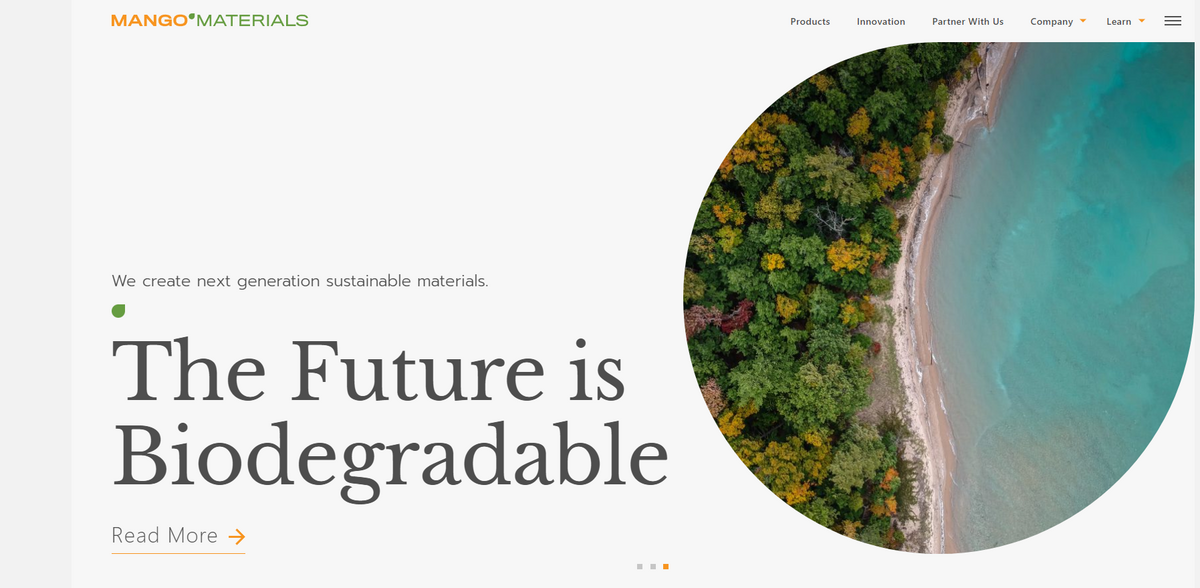About the Project
Mango Materials creates next generation sustainable materials. THE FUTURE IS BIODEGRADABLE. This initiative takes pride in harnessing nature’s plastic concept – biodegradable replacements to polluting plastics and polyester. The approach is all about a closed loop, going “from nature, back to nature,” providing circular biopolymer solutions for a sustainable world. The concept is dynamic and forward-thinking, with thorough collaboration among first-class engineers, scientists, entrepreneurs, and innovators. The project’s foundation is centered on the idea that traditional plastics and polyesters are destroying our planet – so an alternative that can save it is essential.
Main Benefits and Key Figures
Key achievements and facts include:
- Nature’s Plastic: Biodegradable alternatives that replace conventional, polluting plastics and polyester.
- Closed Loop Solutions: Innovative methods turning raw natural inputs back into useful materials for a circular economy.
- End-to-End Solutions: Partnering throughout the supply chain from branded products to methane emissions.
- Strategic Collaborations: Agreement with the City of Vacaville, which recently approved a long‐term lease and biogas purchase agreement to support commercial scale-up.
- Advanced Research: Collaborations with Berkeley Lab ABPDU and testing bioreactor performance on weightless parabolic flights – research that might lead to 3D printing of bioplastic in space.
Innovative Solutions in Biopolymer Development
The project emphasizes the innovative development of PHA – a family of biopolyesters naturally produced by bacteria and other life forms. It is remarkable how PHAs, including PHB, differ from polymers like PLA, as they biodegrade in many environments, including the oceans, reducing the burden of plastic waste. Occasional ellipses in the research narrative indicate the continuous flow of innovation… as new applications for the naturally occurring biopolymer emerge, everything is pushed further in the quest for sustainability.
End-to-End Sustainable Partnerships
Collaboration is at the heart of this revolutionary venture. Through end-to-end solutions, the project partners with various members of the supply chain – from branded products to methane emissions. In a noteworthy development, Mango Materials entered an agreement with Vacaville, sealing a long-term lease and biogas purchase agreement. Such partnerships ensure that every stage of the biopolymer production process is as sustainable as possible. The strategy not only reinforces a circular economic model but also underlines a commitment to producing materials that are both biodegradable and biobased.
Pioneering Environmental Research
Cutting-edge research is an integral component. Mango Materials harnesses ancient microbes to create carbon-negative materials, advancing green technology while emphasizing a climate-positive approach – fish safe, wash safe, ocean safe, and climate positive. Collaborative efforts with Berkeley Lab ABPDU help optimize processes and test industrial-scale equipment. Research extends beyond terrestrial benefits, with experiments testing bioreactor performance during weightless parabolic flights, a fascinating exploration that paves the way for potential 3D printing of bioplastic in space. The initiative even advances aquatic environmental uses of PHA, demonstrating its versatility.
The Multifaceted Project Impact
Sustainable development goals closely linked to this project include:
- SDG 9: Industry, Innovation and Infrastructure – Embracing revolutionary biotechnologies and innovative engineering methods.
- SDG 12: Responsible Consumption and Production – Focusing on creating materials that reduce environmental strain.
- SDG 13: Climate Action – Converting methane into biopolymers and developing climate positive materials.
- SDG 14: Life Below Water – Ensuring that the biopolymers biodegrade safely, even in marine environments.
Future Outlook and Circular Economy
Looking ahead, products made from these materials are designed to minimize their impact on the planet and contribute to a truly circular economy. With YOPP PHA Pellets, for example, the project provides customized, specifically formulated pellets tailored to unique material performance requirements, addressing modern challenges in plastics pollution and climate change simultaneously. The approach, where rapidly regenerative feedstocks such as plants, wastes, and residual gases are used, ensures that the end-of-life materials biodegrade naturally in any environment where biology is present. This means that even when the goods are no longer needed, they fully integrate back into nature. The future of sustainable material innovation, powered by these cutting-edge developments, is looking promising, driven by deep-rooted research efforts and creative industrial partnerships… Mango Materials is unmistakably leading the bio-industrial revolution, setting the stage for a cleaner, more sustainable future for all.


















